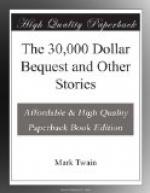It is almost a fortnight now that I am domiciled in a medieval villa in the country, a mile or two from Florence. I cannot speak the language; I am too old not to learn how, also too busy when I am busy, and too indolent when I am not; wherefore some will imagine that I am having a dull time of it. But it is not so. The “help” are all natives; they talk Italian to me, I answer in English; I do not understand them, they do not understand me, consequently no harm is done, and everybody is satisfied. In order to be just and fair, I throw in an Italian word when I have one, and this has a good influence. I get the word out of the morning paper. I have to use it while it is fresh, for I find that Italian words do not keep in this climate. They fade toward night, and next morning they are gone. But it is no matter; I get a new one out of the paper before breakfast, and thrill the domestics with it while it lasts. I have no dictionary, and I do not want one; I can select words by the sound, or by orthographic aspect. Many of them have French or German or English look, and these are the ones I enslave for the day’s service. That is, as a rule. Not always. If I find a learnable phrase that has an imposing look and warbles musically along I do not care to know the meaning of it; I pay it out to the first applicant, knowing that if I pronounce it carefully he will understand it, and that’s enough.
Yesterday’s word was avanti. It sounds Shakespearian, and probably means Avaunt and quit my sight. Today I have a whole phrase: Sono DISPIACENTISSIMO. I do not know what it means, but it seems to fit in everywhere and give satisfaction. Although as a rule my words and phrases are good for one day and train only, I have several that stay by me all the time, for some unknown reason, and these come very handy when I get into a long conversation and need things to fire up with in monotonous stretches. One of the best ones is DOV’ `E il Gatto. It nearly always produces a pleasant surprise, therefore I save it up for places where I want to express applause or admiration. The fourth word has a French sound, and I think the phrase means “that takes the cake.”
During my first week in the deep and dreamy stillness of this woodsy and flowery place I was without news of the outside world, and was well content without it. It has been four weeks since I had seen a newspaper, and this lack seemed to give life a new charm and grace, and to saturate it with a feeling verging upon actual delight. Then came a change that was to be expected: the appetite for news began to rise again, after this invigorating rest. I had to feed it, but I was not willing to let it make me its helpless slave again; I determined to put it on a diet, and a strict and limited one. So I examined an Italian paper, with the idea of feeding it on that, and on that exclusively. On that exclusively, and without help of a dictionary. In this way I should surely be well protected against overloading and indigestion.




